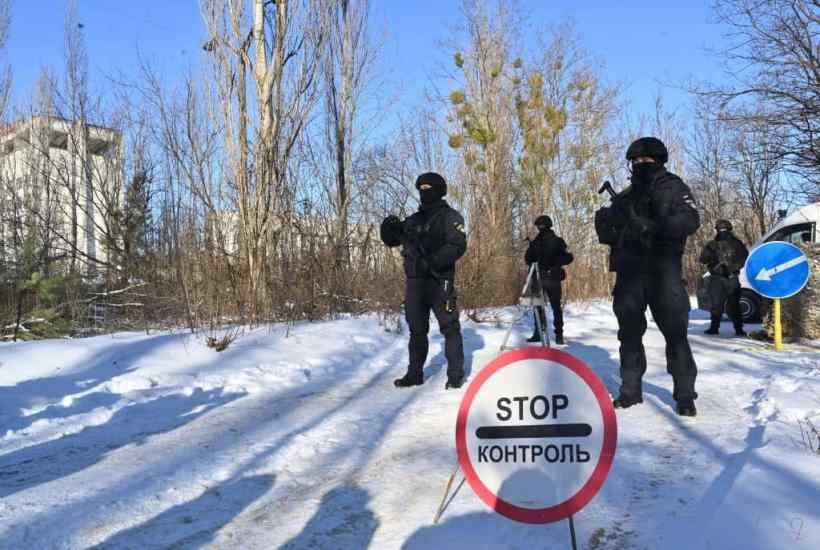The word ‘Chernobyl’ sends a shiver down the spine of most Europeans, and with good reason: it was the site of the world’s worst nuclear catastrophe. Now it has been seized by Russian forces in their ongoing invasion of Ukraine. So what is Putin up to? And does the world need to worry? The simple answer is yes: this is an act of war that could end up affecting us all.
Radiation levels have reportedly increased at the site since the invasion, potentially in response to Russian shelling or radioactive dust being kicked into the air after the arrival of heavy military equipment in the area. There could be catastrophic consequences should more of the site be damaged. There is a risk of ecological and nuclear disaster at the site. But is the West listening?
Mykhailo Podolyak, an official in the Ukrainian president’s office, has warned:
‘It is impossible to say the Chernobyl nuclear power plant is safe after a totally pointless attack by the Russians’
The decision to seize the site of the wreckage of the nuclear power plant offers an insight into Putin’s mindset. For a man obsessed with history and the fall of the Soviet Union, Chernobyl has undoubted significance for Russia’s president. The collapse of the Soviet Union arguably began with the explosion at Chernobyl in 1986. As has been well-documented, Putin has spoken of his belief that the decline and fall of the Soviet Union was ‘the greatest geopolitical catastrophe’ of the twentieth century. Thirty years after the anniversary of the USSR’s collapse, Dr Taras Kuzio from the Henry Jackson Society says it is evident that Putin is ‘an angry old man who has never gotten over the collapse of USSR.’
The seizure of Chernobyl also reveals much about Russia’s ongoing military strategy. It highlights the significance of nuclear weapons to the ongoing struggle. And it makes it all too clear that if more ‘conventional’ Russian attempts to occupy the country do not go to plan, Putin now has control of nuclear resources that might be used. The potential for nuclear warfare – which Putin hinted at in his diatribe this week, justifying the invasion of Ukraine – is now a very real threat.
But even if seizing Chernobyl doesn’t turn out to be the first step in such a devastating wider conflict, the targeting of this nuclear wasteland hints at something else: the role that Belarus could play in the ongoing crisis. Chernobyl sits close to the Belorussian border, yet according to Jack Keane, former chief of the US Army Staff, the site of Chernobyl ‘doesn’t have any military significance’. He’s wrong. Why? Because it sits on one of four routes that Russian forces have used to invade the country. Chernobyl is a key location for Russia to have captured because it offers the shortest route to Kiev from staunch ally Belarus, where Moscow has staged troops. If Belorussian troops join their Russian brothers-in-arms, this route through Chernobyl would prove critical for their route onwards to the Ukrainian capital.
Will the attack on Chernobyl finally wake up the West? European leaders have been reluctant to react too strongly to Putin’s aggression. Yet if radioactive dust ends up covering the whole continent they could get a nasty wake-up call. An advisor to Ukraine’s interior ministry, Anton Gerashchenko, wrote on Facebook that:
‘If as a result of the occupiers’ artillery strikes the nuclear waste storage facility is destroyed, the radioactive dust may cover the territories of Ukraine, Belarus and the EU countries.’
In light of the nuclear threat posed to all of Europe, there are concerns by those close to Ukrainian leader Volodymyr Zelensky, voiced by those such as his aide Oleksiy Arestovych, that the Russian army may have seized the site for blackmail purposes. Kuzio has argued that: ‘Russia is seeking to use the occupation of Chernobyl as blackmail against Ukraine and the West, warning if they don’t capitulate then there will be some form of consequences.’ He says this must be positioned within a broader series of tactics employed by Putin, who was ‘playing nuclear war games last week and making a vitriolic threat on Tuesday of unforeseen consequences if the West intervenes.’
So what it Putin up to? After the events of this week, it’s impossible to say. What is abundantly clear however is that the seizure of Chernobyl has the potential for devastating environmental, ecological, nuclear, and military consequences which could cripple the European continent. This war may not just against Ukraine, but against Europe as a whole.
Got something to add? Join the discussion and comment below.
Get 10 issues for just $10
Subscribe to The Spectator Australia today for the next 10 magazine issues, plus full online access, for just $10.



















Comments
Don't miss out
Join the conversation with other Spectator Australia readers. Subscribe to leave a comment.
SUBSCRIBEAlready a subscriber? Log in